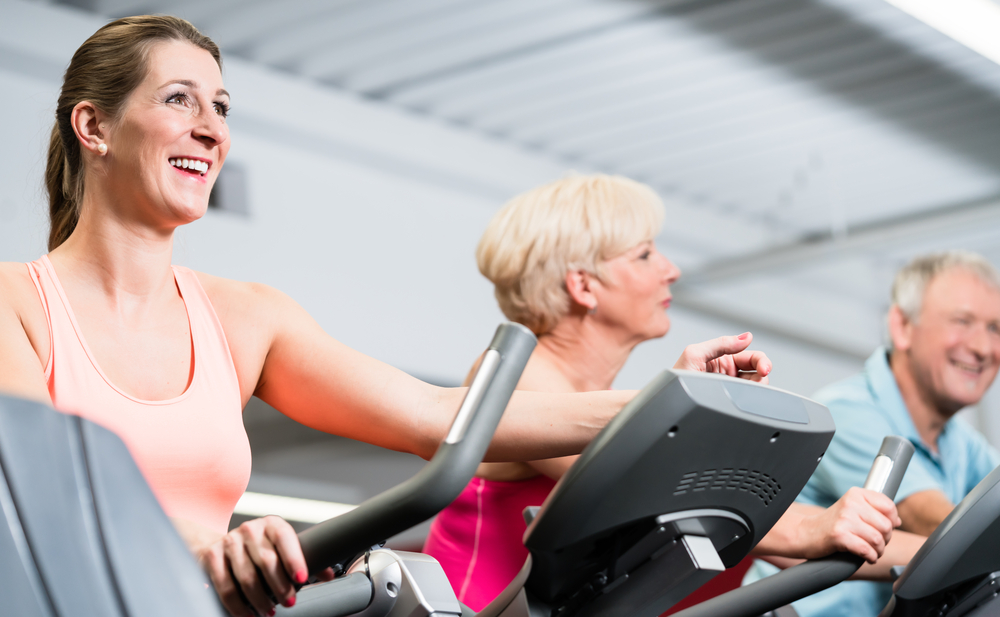If you started 2019 with a resolution to lose weight or get fit then you may have found that you need some extra help and motivation by now. In fact, 80% of people who join the gym in the new year will quit by the second week in February and generally speaking, 50% of people who join the gym will quit within six months.
So what can you do to stick to, and get the most out, of your new regime? James Brown, lecturer in biology and biomedical science at Aston University, told The Conversation how to stay motivated – he also answered some burning fitness questions in a Facebook Live session.
How much exercise do we need?
That’s the $64,000 question. National government recommendations, which were published recently, suggested that actually, the current thinking is that you need to do 150 minutes of exercise a week, and that you need to do a proportion of exercise that is regarded as moderate exercise. It is felt that if you go to the gym two or three times a week, that’s the kind of levels of exercise you need to do.
However there is some evidence that even people who don’t exercise throughout the week, but manage to fit their activity in at the weekend – so they go walking or they play part of a sport club – have the same outcomes in terms of health and disease as people that exercise throughout the week. The so-called “weekend warrior” effects of people that have a sedentary job during the week, but exercise at weekends has been shown to actually be as beneficial as exercising throughout the week. And that’s a really interesting finding because we know that spending more time sitting down is very bad for us.
So there isn’t really a set figure that’s backed by hard science. The most important thing is to be as active as you can manage. So if you can manage to go to the gym two to three times a week, great. If you can only manage to go to the gym once a week then make sure that on your non-gym days, you’re being as physically active as possible. So every hour make sure you get up from your desk, if you work at a desk – walk around, get the blood moving, get your legs and your muscles contracting.
If you’re walking around an office then that’s better than sitting down, and if you get the opportunity to take the stairs instead of the lift (which is a big thing as in Aston University because we’ve got seven storeys), then try and take the stairs – it’s really good exercise.
What about training for long durations?
I think it’ll depend on the training that you’re doing. It’s important to make sure you’re not having a negative effect on your health by over-training . So if you’re doing training that’s at a relatively moderate intensity for two hours then it’s going to depend on the individual. Some individuals have a body type which is going to be able to support that level of exercise – athletes, elite athletes particularly, will cope with two hours at the gym absolutely fine.
If you’re a newcomer to exercise – and that’s really what we’re talking about, as most people that are making their new year’s resolutions and maybe are struggling to stick to them – two hours at the gym might be too much.
And in terms of trying to maintain that motivation, make sure that what you’re doing is manageable. So don’t do so little that you leave the gym without a bead of sweat on you, but make sure you’re not doing so much that you are in so much pain for days afterwards that you’re unlikely to go to the gym again for another week. Find the level that you can manage and build on that level as you go through your exercise regime.
Protein shakes or lean meat to build lean muscle?

Shutterstock
That’s a really good question. I think taking protein in after a workout, particularly if you’ve done resistance training, is very important for building and maintaining muscle mass. It used to be felt that there was a window in which you needed to take protein in, and that was a couple of hours, but that’s kind of been dispelled. So as long as, probably within 24 hours of your exercise, you take in 20 to 30 grams of protein then you’re going to stimulate muscle protein synthesis.
Read more…
Do athletes really need protein supplements?
The benefit of taking a whey protein shake, rather than eating meat that contains the same amount of protein, is that it’s often absorbed faster because it doesn’t have to be digested. Beyond that, just make sure you’re maintaining a protein intake in your diet that’s likely to be helping to maintain or increase the size of lean body mass after exercise.
I’m very time poor – if I want to put what little time I have into the best exercise for general health and a toned body, what should I do?
I think many of us are time poor. The key is understanding that exercise doesn’t have to be in large chunks on set days. So make sure that you’re walking as much as you can throughout the day.
If you have a high intensity interval training regime when you’re at home that takes ten minutes, so ten minutes of exercise, it doesn’t have to cost anything because the exercises which we do as part of a high intensity interval training exercise could be calisthenic based: it could be squats or star jumps for example, that’s not going to take up a lot of your time. Ten minutes every other day or three days a week is going to help you remain fit and will fit in with your busy schedule.
Read more…
Don’t have time to exercise? Here’s a regimen everyone can squeeze in
James Brown, Senior Lecturer in Biology and Biomedical Science, Aston University
This article is republished from The Conversation under a Creative Commons license. Read the original article.

